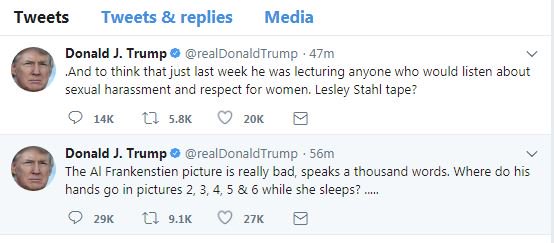Heather Long at WP:
Trump has promised Americans “huge” tax cuts, but only 44 percent of taxpayers would see their tax bills reduced by more than $500 in 2019, according to JCT's analysis of the winners and losers in the plan. The chart below was first reported by The Washington Post after a GOP senator's office shared it.
“We're going to give the American people a huge tax cut for Christmas — hopefully that will be a great, big, beautiful Christmas present,” the president said last week.
Overall, the majority of Americans -- 62 percent -- would get a tax cut of at least $100 in 2019, according to JCT. The remaining 38 percent would either pay about the same in taxes as they do now or get a tax hike.
But by 2027, just 16 percent of Americans would get a tax cut of at least $100. The "winners" fall dramatically because the tax cuts for individuals go away in 2026 in the Senate GOP plan. Republicans argue that those tax cuts are likely to be extended by a future Congress.Harry Enten at FiveThirtyEight:
About a third of voters currently support the Republican tax reform package, according to an average of five surveys released1 this month. In a Quinnipiac University survey, just 25 percent of voters approved of the plan. Surveys from ABC News/Washington Post, CNN, Morning Consult and YouGov put approval of the plan slightly higher, but all are still at 36 percent or lower. Meanwhile, an average of the five polls puts opposition at 46 percent.
Why is support so low? Americans are opposed to the bill because they think it disproportionately benefits the rich. (It likely will.) President Trump’s administration has argued, however, that there were similar complaints about the Reagan tax cut plan of 1981, which preceded an economic boom.
The Reagan plan, though, was far more popular in 1981 than the current Republican plan is now. In a Gallup survey taken in the days after Reagan signed his tax cuts into law on Aug. 13, 1981, 51 percent of Americans were in favor of it. Just 26 percent of Americans were opposed. The other major tax cut of the Reagan administration (signed in 1986) wasn’t nearly as popular, but it was still more popular than the current GOP legislation. A CBS News/New York Times survey conducted in the days after the bill passed Congress found 38 percent in favor and 34 percent opposed.
Indeed, major tax cut plans are usually more popular than unpopular. Heck, even some tax hikes have been more popular than the current GOP bill.2






